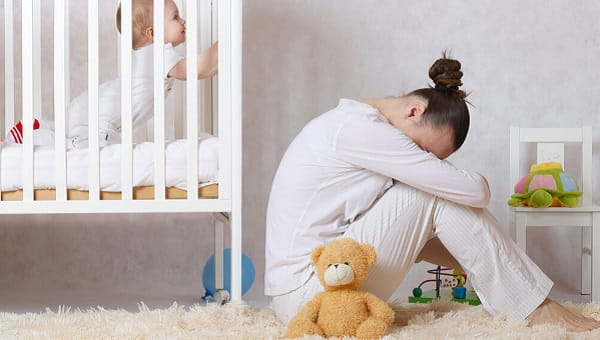Most new moms deal with the “baby blues,” the mood swings, fatigue, insomnia and anxiety that can follow the birth of a child. For many, these symptoms disappear within a couple of weeks once mom’s hormone levels even out. But for others, the symptoms don’t get better—they get worse. Or, they may not even show up until a few months after baby arrives.
How is postpartum depression different?
Postpartum depression, or PPD, is real, clinical depression. A mom with PPD can’t just “snap out of it,” she’s not lazy or whiny or a bad mother—she has a serious condition that needs treatment. Symptoms of PPD include:
- feeling sad, hopeless or guilty
- feeling like she can’t care for her baby or handle other basic functions
- crying a lot, sometimes without knowing why
- having trouble bonding with her baby
- sleeping too much, or being unable to sleep
- eating too much, or not enough
- no interest in being around others or doing other things she once enjoyed
- having trouble staying focused, making decisions or remembering things
Sometimes, moms with PPD even have thoughts of hurting themselves or their baby. These thoughts are not the mom’s fault, and they don’t mean that she would actually hurt anyone—but she should talk to someone she trusts, like a doctor, about her thoughts.
Who is more likely to deal with PPD?
Postpartum depression doesn’t care about age, race, ethnicity or any other socioeconomic factor—any mom can develop PPD. In fact, about one in eight new moms will. There are some risk factors that may make a woman more likely to experience PPD, though, including:
- having symptoms of depression in the past, especially after having a baby
- stressful events, like the illness or death of a loved one, losing a job or an abusive relationship
- an unplanned pregnancy
- a family history of mental illness
- not enough support from family and friends
- complications during pregnancy or childbirth, or a baby with health problems
- using drugs or alcohol, or having used them in the past
How is PPD treated?
PPD can be treated with counseling, where the mom talks about her feelings and worries, and learns how to solve problems and feel better. Antidepressant medications work to “fix” the levels of brain chemicals that can lead to depression. These medications can take a few weeks to work, but they usually help and can be safe for breastfeeding moms and their babies.
Without treatment, PPD can drag on for months, or even years, and affect everything in a mother’s life—including the health and well-being of her baby. That’s why it’s really important for any mom who has these symptoms to talk with her doctor about treatment options.
We offer a variety of classes and support for moms who may be experiencing feelings of stress, baby blues or postpartum depression/anxiety. Whether you're a first-time mom or adding to your family, these classes are here for you. Visit BayCareEvents.org to find a class near you.




